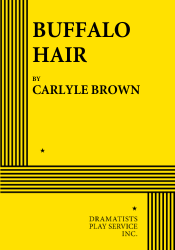
THE STORY: During the night, on a dusty, sage-brush covered island on the southern plains, in the middle of the Red River, black Buffalo Soldiers capture a young warrior called Buffalo Hair, a black man who has chosen to live among the Cheyenne ever since they saved his life. The soldiers find their captive to be a foe from without and within, being so much alike and different from themselves. To Buffalo Hair, his captors are slaves to the white man and enemies of his true people, the Cheyenne. In the morning, a hundred Cheyenne warriors will come to the river to take Buffalo Hair back. Now the soldiers must choose whether to stay loyal to the army and fight, or let Buffalo Hair go and have a chance at saving themselves. Disagreement between the troopers builds to a confrontation. In the excitement a pistol is fired, bringing a hundred Cheyenne warriors down on the island. When the dust clears, the soldiers are captives and now it is Buffalo Hair’s turn to choose. He can kill and scalp the black soldiers to prove he is a true Cheyenne, or let them live and become one of them. In the end, Buffalo Hair chooses the warrior’s road, and extracts ritual atonement from the abandoned black soldiers.
Race, war and history collide in this play, set in 1874, the year of the Red River War on the southern plains, when a group of black troopers of the Tenth Cavalry, Buffalo Soldiers, are sent to suppress an uprising of the Southern Cheyenne.
“Playwright Carlyle Brown aptly exposes the ambiguity of racial identity and the tragedy of the “divide and conquer” mentality which pitted African Americans against Native Americans…BUFFALO HAIR is powerful stuff…” —Insight News.
“Basing his play on…historical fact, Brown takes a new slant on the traditional Western, attempting to come to terms with history, to rewrite and reclaim the past. He moves beyond typical melodrama and fashions a powerful examination of the complexities of race…and what it means in the lives of the characters.” —Equal Time.
